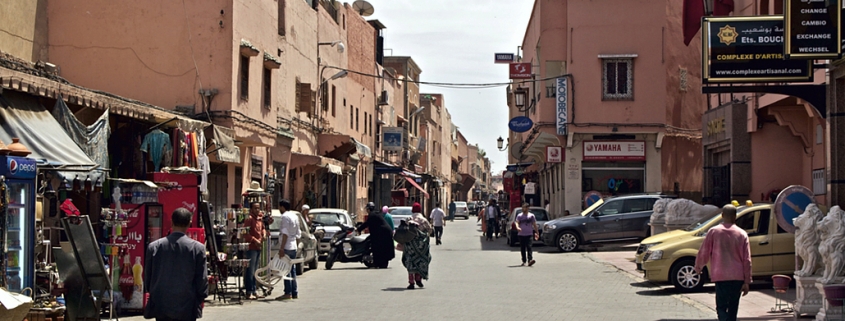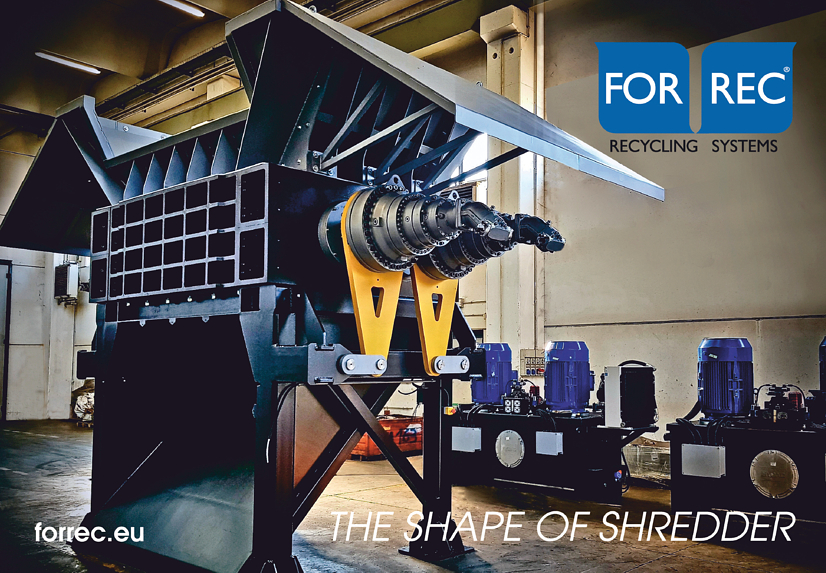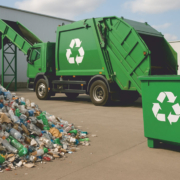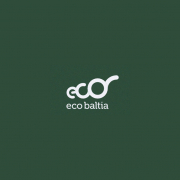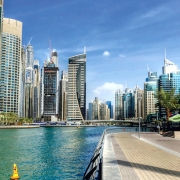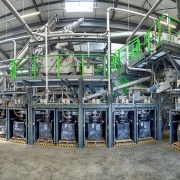Waste Management in the Arab Region: Recycling on Trial
Increasing quantities of waste have become a problem for countries of the North African and Middle East nations, especially for more than half the region’s population living in urban centers and being affected by often seriously inadequate waste management systems.
Whether these states are called the Middle East and North Africa (MENA), Gulf Cooperation Council (GCC), Mashreq & Maghreb or Arab Region: What unifies the countries is the trial to develop and install tailor-made technical, financial and organizational solutions – with varying degrees of success and often slow progress.
Researchers at the University of Rostock characterized Arab countries by not yet established proper waste legislation, clear legal standards and long-term strategies, not functioning organizational structures, the lack of separate collections of recyclable materials, a high percentage and variety of decomposable material in municipal solid waste, and the existence of hazardous substances in residual waste. Furthermore, it should not be forgotten deficits of trained personnel, unequal service between rural and urban areas and the absence of a reliable database.
Discrepancy between costs and revenues
The centralization of authority at the national level – if not divided between different, partly responsible ministries, departments and governmental levels – and the absence of effective cost recovery mechanisms must be taken more seriously. According to development expert South-South Cooperation, the governments either fund collection and disposal of municipal solid waste the most – in Tunisia, Lebanon and Yemen – or offset the discrepancy between costs and revenues of waste disposal – in Algeria, Egypt, Syria, Jordan and the Palestinian Territory. Cost recovery is partially implemented in Algeria, Egypt, Syria, Jordan, Lebanon (Zahlé only) and the Palestinian Territory; in Morocco, Tunisia, Yemen and Mauritania costs cannot be recovered by the services. In Egypt and in Jordan, cost recovery arrangements are made through the electricity bills.
The low financial cover ratio of municipal solid waste treatment is obviously the debt of too small recycling rates. In 2014, waste processing in Algeria contained 60 to 65 percent of discharging by landfill, 30 to 35 percent of burying, seven percent of recycling and one percent of composting. In Saudi Arabia, municipal waste consists of food waste (40 to 51 percent), paper (12 to 28 percent), cardboard (seven percent), plastics (five to 17 percent), glass (three to five percent), wood (two to eight percent), textile (two to six percent), metals (two to eight percent) etc. depending on the population density and urban activities of that area. The waste is collected and sent to landfills or dumpsites after partial segregation and recycling. The main recycling is concentrated on metals and cardboard, covering ten to 15 percent of the total waste and mostly carried out by the informal sector, the online-platform EcoMENA gave account in June 2017.
Missed public awareness
These quotas are partly explainable by hitherto omitted public environmental consciousness in the region. In August 2017, a survey was carried out in Oman to understand the degree of waste management awareness. Only twenty percent of the respondents were aware of any local program for recycling, and none of those were informed of any active recycling program in their neighborhood or workplace. Few of the interviewed had heard of plastic bottles collection somewhere in the city, and few remembered people salvaging empty aluminum soft drink cans in the streets and parks. They assumed that the disappearing of this recycling was caused by fallen prices of cans several years ago. One year later, a survey in Qatar on waste awareness showed similar results: Half of the surveyed people recycle either at home (11 percent), work (16 percent) or both (23 percent). But the other half has never recycled. 71 percent of men and 58 percent of women do not recycle. Besides that, the collection focus lies on the volume of waste, not on its quality: “The volume of the plastic waste generated is higher, followed by food waste (19 percent) and paper (12 percent). Metal, electronic waste and glass are the least amounts of waste generated in Qatar,” EcoMENA summarized.
Insufficient governmental framework
The low recycling rates in the region also result from political circumstances. Without question, in these years the MENA region went through a critical period of turmoil, death and destruction and was partly affected by political rumors as well. David Newman, President of the International Solid Waste Association, described the situation in 2015 as follows: “As their economies have suffered, citizens have been less able to pay for waste and other taxes. As a result, infrastructure has become run-down or has been closed, international companies have deserted the area, and private investors look elsewhere.” In fact, some of the politics curbing a better infrastructure for waste were also obviously homemade.
According to a study of Ernst & Young in 2014, the most important barriers to the propagation of cleantech were insufficient governmental policy rules and regulations (43 percent on average) and cost of technology (28 percent), followed by subsidies for fossil fuel-based energy (16 percent) and limited experience of potentially financing banks (13 percent). With regional differences: In the Gulf states, politics accounted for 59 percent, in the Levant and North African 46 and 45 percent respectively.
The will was there
Already in 2010, Global Information Society Watch reported: “Many governments are aware of the necessity of implementing e-waste strategies due to the increasing amount of e-waste in recent years and the expected acceleration of e-waste in the decades to come. Governments and the private sector have shown successful collaborative initiatives and are expected to continue along this path,” the organization was quoted. Further need for take-back programs and recycling addressed by national governments and the assistance by mostly multinational companies of the communication equipment branch was noticed. The political will was there, for example in Algeria, where the National Program for Integrated Management of household and similar waste (PROGDEM) since 2002 designed the launch of 122 class 2 technical landfill centers and 146 controlled landfills, the rehabilitation of 101 unauthorized dumps as well as the achievement of 32 landfills, 29 sorting centers and 26 transfer stations. For 2014, the rehabilitation of 348 medical waste incinerators, the completion of two class 1 facilities for the management of hazardous industrial waste, and the start of a landfill for hazardous waste were planned.
No lightning start
However, the prosperity of, for example, e-waste recycling in the Arab Region until 2014 was no lightning start, according to a detailed study published by the Regional Solid Waste Exchange of Information and Expertise Network in Mashreq and Maghreb Countries (Sweep-Net). The organization reported the business of a battery and a hazardous waste recycling plant in Algeria; showed the existence of the Egyptian Electronic Recycling Company, the WEEE collection companies Recyclobekia and Ecycle, and the planning of a specialized recycling plant in Egypt; stated the formal e-waste management being “in its early stages of development” in Morocco, including governmental projects, bilateral cooperation with the German international cooperation GIZ on waste management and the setup of a hazardous waste treatment plant in cooperation with the German bank of reconstruction (KfW, a German government-owned development bank); in Tunisia a recycling facility was almost operating, run by Agence Nationale de Gestion des Déchets; collection and transfer of e-waste with a capacity of 1,000 tons/year were envisaged.
But for the Palestinian Territory, Syria, Mauretania, and Jordan no e-waste related data were available – partly not even quantities – and reliable information were impossible to find. This also applies to Lebanon, where a lack of process and disposal facilities and no legislation to manage e-wastes is witnessed. But the Sweep-Net study also confessed a “spreading awareness on the e-waste issue”, told of a public-private partnership with GIZ and Hewlett Packard and mentioned a take-back-program by mobile phone producer Nokia. However, Rafael Widmer, Project Associate at the World Resources Forum, still in August 2017 had to add: “In almost all GCC countries, there is minimal to zero legislation on e-waste, with minor differences between the respective counties.”
Not beyond the beginning stage
One might interpret that the glass is half empty and notice that “in nearly all Arab states, waste management developments are still in their infancy”, as researchers at the Rostock University did in 2015. But others might see the glass as half filled, because “most governments in the Arab states have recognized the waste management problems and want to implement suitable solutions.” In 2016, another group of researchers at the Rostock University stated a developing environmental awareness relatively pronounced in recent years. The experts saw “numerous waste-industrial activities”, but had also to concede that “many projects and plans have been stopped after the tendering phase or processing of the study and not implemented, as legal, organizational, financial and technical framework for their implementation is lacking”.
This applies especially to the waste-to-energy sector. In 2015, Egypt ran a handful of independently led treatment facilities whose operating has not yet managed to produce proof of its reliability. In Saudi Arabia, several of the mechanical-biological waste treatment facilities were only operated for a short space of time. Lebanon had a few small plants for sorting and composting, while in Kuwait the only facility in place ran merely occasionally. So in spite of an awoken interest for energy recovery from waste, the region did not move beyond the beginning stage.
Implementations in North Africa
Meanwhile, the governments had started the implementation of their recycling plans. Morocco, supported by the World Bank, aims to increase the rate of recycled material to 20 percent by 2022 while improving the conditions of waste-pickers. Oum Azza is said to be the Maghreb’s largest modern landfill facility for the decomposition of organic waste to biogas. And the total investment for a National Special Waste Elimination Center is estimated at 90 million Euro between 2015 and 2035. In Egypt, the National Solid Waste Management Program investment has been wrapped up, supported by 20 million Euro from the EU, and another 41 million Euro by KfW, GIZ, Swiss Cooperation and the Government of Egypt. For Algeria, the Dutch Ministry for Foreign Affairs recently released an information paper on “Business opportunities in waste management in Algeria” – commissioned by the Netherlands Enterprise Agency – that reports about plans of 125 new landfill sites in the coming five years. When the program is finished, the country will have 300 controlled landfill sites. According to the information, this should be enough infrastructure to receive 75 percent of the municipal solid waste of the country. In 2017, the Jordanian government offered “Investment Opportunities in Waste to Energy Projects” and invited qualified private sector developers, joint ventures or consortia with in-depth experience in waste-to-energy-BOO(T) schemes to apply for participation in submission of proposals for the design, financing, construction, commissioning, ownership, operation and maintenance of such a plant in the country.
Implementations in the Middle East
In October 2017, the Public Investment Fund in Saudi-Arabia announced to establish a Saudi Recycling Company to support and operate its investments in domestic recycling projects, covering all recyclable materials and each stage of the value chain. The local facilities management market is expected to be worth approximately 44 billion Euro by the end of 2030. In 2017, Oman was closing all of the 317 local dumpsites, planned the establishment of ten to 11 engineered landfill sites and 18 to 25 transfer stations, and completed the privatization of its municipal waste management by offering Environmental Services Holding Company – known as Be’ah – to foreign companies like Spain’s Urbasar, Dubai-based Averda and a joint venture between Oman’s Al Ramooz and Veolia headquartered in France. And in June 2018 the Federal National Council of the United Arab Emirates passed a new federal law on integrated waste management – the first in the region. Additionally, planned and in different states of construction are a facility for 900 tons a day in Sharjah, a cement waste-to-energy plant for 28 million Euro in Abu Dhabi, a waste-to-energy plant of approximately 480 million Euro value for a capacity of 2,000 tons a day in Dubai and another for daily 900 tons in Sharjah.
A radical move to be made
In total the residential states of the Arab region have set ambitious targets, but – according to the Rostock researchers – they still lack centralized authority at the national level, practical know-how amongst decision-makers, effective cost recovery mechanisms, and sustainability of the intended projects. Solutions have to be found that are feasible under the given or expectable conditions.
Cooperations with international institutions should be featured – for pilot projects, apprenticeships, higher education schemes or institutional development. Targeted knowledge transfer is wanted to realize “multi-purpose decentralized waste management centers” like small composting plants, recycling centers and simple sorting plants in the plural of municipalities. And to launch industrial-scale pilot projects in large cities in conjunction with international specialized companies.
This meets accurately what Abhay Bhargava, Associate Director & Regional Head at Frost & Sullivan, noted in August 2016: “GCC will have to make a radical move towards integrated waste management with emphasis on ‘waste-to-value’ methods such as recycling and waste-to-energy coming into the picture. This can already be seen in the form of the recent tenders for waste management in the GCC, as well as in the Middle East and North Africa (MENA)”.
Photo: pixabay
GR 12019

